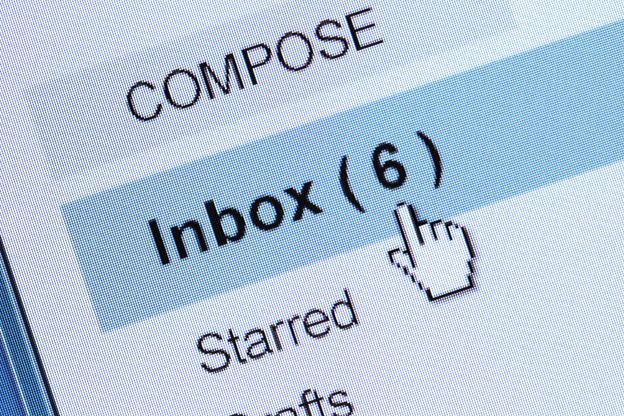Is email broken?
- Published
- comments

For many people, email was their first experience of online communication, and seemed at first a magical new way of connecting at work and at home. Now, though, it looks old hat. Teenagers, we are told, are using everything from Snapchat to WhatsApp to communicate and are unlikely to respond if you email them - something I can confirm from personal experience.
Even in the workplace, the usefulness of email is being increasingly questioned. The sheer volume of messages is one issue, the etiquette of how you compose emails and who needs to be copied in on them is another. Some firms have acted to restrict the flow - the German carmaker Daimler stops employees from receiving messages while they are on holiday, and the IT firm Atos even talked of banning internal email altogether.
As someone who seems to spend much of his day just deleting emails, I decided it was time for an audit. I would analyse the contents of my inbox over one day, and work out just how useful email was to me - and to those messaging me. And then I would ask myself - could I consider giving it up?
The day I chose was not particularly busy but I still received a total of 275 emails. Of them, 70 were internal messages, many addressed to me as part of a wider group. No fewer than 19 concerned a discussion of whether it was the Chinese Year of the Sheep or the Goat. This was, amusing at first but then grew infuriating as each person copied in everyone on their musings - until three people copied in everyone on their wish for this to stop. A classic case of bad email etiquette.
Of around 200 emails from outside my organisation, many were from mailing lists I signed up to in the dim and distant past - I'm not sure I still need Opec's Daily Digest of oil prices, but maybe Music Ally's daily bulletin from the music industry will turn up trumps one day. But what is clear is that I need to a spring clean to stem the flow.
That will not stop the torrent of pitches from PR folk bent on selling me stories they are convinced BBC audiences need to hear. I counted 50 of these, many relating to the forthcoming Mobile World Congress in Barcelona. I'm afraid some of the people behind them need to go back to the Email Academy.
"Dear Sir or Madam," is never a good start. When the email continues "an infrastructure COTS hardware solution provider for telecom and cloud networks, is demonstrating new game-changing NFV- and SDN-enabled reference solutions in collaboration with industry partners during Mobile World Congress," the only response is to reach for a dictionary.
Other emails asked whether I was "interested in talking about enterprise messaging solutions", or they promised exciting news about a company which "delivers security policy orchestration through an automated and unified approach to security policy management across heterogeneous platforms". The vast majority of these messages were both poorly expressed and badly targeted, and on a normal day I would have deleted many of them with barely a glance.
So, for these PR firms and their clients, email is proving a very ineffective communications tool. And in general, I find phone calls, social networks or, best of all, face-to-face meetings better ways of connecting with organisations and individuals with stories to tell.
Inside my organisation, we have experimented with various new ways of communicating. The corporate social network Yammer thrived in a minor way for a while, but I haven't looked at it for years. We sometimes use shared Google documents or Evernote notebooks to coordinate specific stories and top line messages in our newsroom computer system are the best way of contacting someone urgently. In recent weeks we've also been trying out an app called Slack which describes itself as "a platform for team communication", though my initial reaction is that it means even more messages for me to digest each day.
Is the answer then to give up on email altogether? Well, no, certainly not in the short-term. Among all the dross, the poorly targeted pitches, the incomprehensible gobbledegook there is still the occasional gem. One of my best stories came in an anonymous email from someone wanting to tell me what was going on inside his company. And email is still the essential social network for most businesses so it just is not practical to drop it.
But we all need to get better at it emails need to be shorter, with the subject line treated as a headline which will tell the recipient whether the rest is worth reading. Most of all, we need to stop and think before copying a message to everyone inside our own organisation or every single journalist acquired from a mailing list.
Now I have to stop writing this - the ping from my computer tells me that another email has arrived. The red sign on my inbox at 7.28 am says I have 190 unread messages and I am sure at least one of them contains vital information - time to get to work.